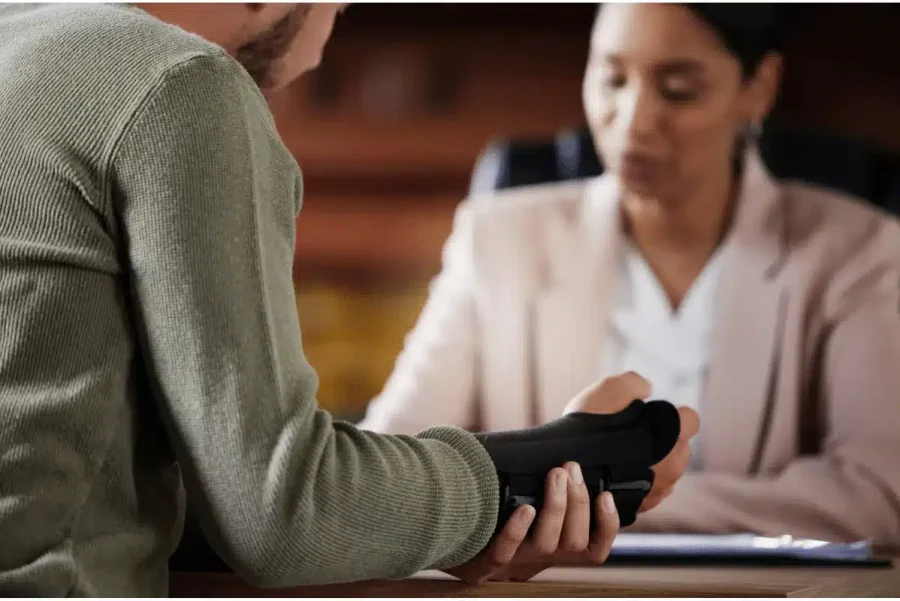All successful personal injury claims are backed by strong, well-organized supporting evidence. Discovery is a pre-trial procedure through which evidence that may not otherwise be accessible can be gathered and prepared. It is one of the most important aspects of the personal injury claims process. Here, Richmond Vona’s knowledgeable New York personal injury lawyers answer some common questions about discovery in accident claims.
What Is Discovery in a Personal Injury Case?
Discovery is the process of exchanging information between parties, helping each side understand what witnesses and evidence they’ll use to argue their case at trial. While it’s possible to avoid discovery by reaching an early settlement, it’s a normal part of the legal process that ensures neither side of a personal injury lawsuit will encounter any surprises in court.
Each side’s attorneys will spend time making and responding to requests for more information from the other, keeping their clients informed every step of the way. Some common tools used during discovery include:
- Interrogatories, or written questions the other party must answer
- Depositions, or interview sessions where parties or witnesses are asked relevant questions under oath
- Document demands, or formal requests to review and copy certain records, photos, and other evidence
- Medical examinations, if the defendant is disputing details of the victim’s injuries
There is a process for parties to make reasonable objections to certain questions or requests, but failing to properly comply with the discovery process can lead to sanctions.
Why Discovery Is So Important in Personal Injury Claims
Discovery is a critical tool for building strong personal injury claims and can heavily impact the outcome and value of your case. Benefits of the discovery process include:
- Uncovering the truth: Discovery opens both sides of the case to a transparent exchange of information, allowing for all relevant facts, documents, and witness testimonies to shape a clearer picture of what actually happened.
- Preventing surprises: In the movies, it’s common for trials to feature “surprise witnesses” or an explosive piece of evidence that bursts into the courtroom at the last minute. This might make for great drama, but it’s not how the legal system works in real life. Discovery ensures each side of the case is fully prepared heading into trial and has all relevant information at their disposal, keeping things fair and transparent.
- Building a strong case: Discovery allows your attorneys to strengthen their foundation of evidence, helping prove the other party’s liability and maximizing your compensation.
- Assessing damages: The comprehensive information provided by discovery can help your lawyers better estimate the potential value of your damages, predicting what you can receive in a settlement or verdict.
- Encouraging settlements: Most personal injury cases settle during or after the discovery process, as the exchange of information allows both sides to more accurately assess the case’s strengths and weaknesses and agree on terms before trial.
- Preparing for trial: If they can’t reach a settlement, both sides of the case will be fully ready for a fair trial after the discovery process.
"At many law firms, the discovery process can drag on for years. We do things differently at Richmond Vona. We’ve built systems, use technology, and have a dedicated team to move cases forward as quickly as possible, without sacrificing quality. Discovery is critical: it’s the stage where we secure the evidence you can’t get on your own, like internal records and sworn testimony.In one case, a young boy was viciously mauled by a dog, and the owners claimed they had no prior knowledge of aggressive behavior. Through discovery, we knew exactly what to ask for and obtained records from the dog’s groomer, who reported the dog had snapped and had to be muzzled during visits. That single piece of evidence was crucial in exposing the truth and helped us secure a seven-figure settlement for our client. Discovery isn’t just paperwork; it’s where cases are often won or lost, and we make sure no stone goes unturned.”
– John Richmond, Co-Founder and CEO

Will You Need to Do Anything During Discovery?
Your New York personal injury lawyer will handle the bulk of the discovery process, but you may be asked to participate in certain activities. During discovery, you may be required to:
- Answer the written questions submitted by the defendant
- Attend a deposition and answer questions under oath
- Share relevant medical records and information that would otherwise be private and confidential
- Submit to a medical evaluation at the defendant’s request
Our experienced litigation attorneys work hard to carefully prepare every client for what they’ll face during the discovery process. We’ll explain what’s happening throughout your case, stay available to answer any questions, and ensure you’re ready to handle anything that comes your way.
How Long Does Discovery Take in New York Personal Injury Cases?
The timeline of the discovery process can vary greatly depending on the complexity of the case, the court’s schedule, the level of cooperation from the opposing party, and other factors.
Delays are common, and an oppositional party might drag its feet to frustrate and lengthen your case. However, strong and experienced legal teams like Richmond Vona can help keep the process on track and resolve it as quickly as possible.
Richmond Vona Guides You Through Every Step of Discovery
You won’t need to navigate the discovery process alone. The experienced New York personal injury lawyers at Richmond Vona can guide you every step of the way. We’ll ensure you’re prepared for all depositions and communicate openly and honestly with you throughout the process, saving you as much time and stress as possible.
Contact us online or call 716-500-5678 today for a free consultation. With our R/V Guarantee, you won’t pay us anything unless we win your case.
